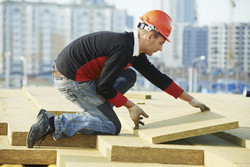New superinsulating materials save money, reduce energy use in buildings
Studies show that energy consumption in buildings is responsible for around 40 % of total European CO2 emissions. The EC's Europe 2020 Strategy related to climate and energy (known as the 20-20-20 targets) seeks to realise 20 % of energy consumption produced from renewable resources, to achieve a 20 % improvement in energy efficiency, and a 20 % decrease in greenhouse gas emissions. Increasing the energy efficiency of European buildings can help to achieve these goals. With this in mind, the EU-funded AEROCOINS (Aerogel-based composite/hybrid nanomaterials for cost-effective building super-insulation systems) project aimed to develop a new class of mechanically strong aerogel composites. Project partners developed new approaches to produce mechanically strong super-insulating aerogel composite/hybrid materials based on polysaccharides. In developing an ambient drying process, they determined that the critical stress point when wet gels crack can be found by calculating the internal pressure evolution. This led to the reduction of the drying rate before the crack progresses. The AEROCOINS team characterised the aerogel materials by developing an optimised hot-wire technique. This method enabled the scientists to characterise very small samples. They also devised strategies to lessen the thermal conductivity of silica-based aerogel materials and enhance their mechanical handling and application properties. Yet another drying process was developed and applied to the production of the aerogel-like material boards. The thermal, structural and mechanical performance of the developed aerogel materials was successfully assessed in two buildings under real conditions and then compared with standard insulating materials. AEROCOINS will impact the world's growing thermal insulation market. Due to a tightening of building code requirements in many European countries and a rise in retrofitting activities, there is a high demand for new materials for building insulation. The project will therefore help Europe save money and make a contribution to the low-carbon economy.
Keywords
Energy efficiency, carbon dioxide emissions, AEROCOINS, aerogel-based composite/hybrid nanomaterials, building insulation

